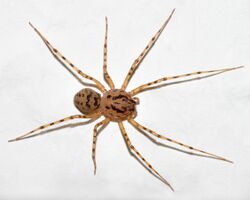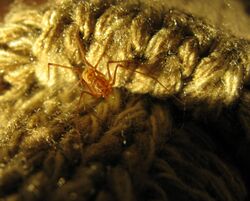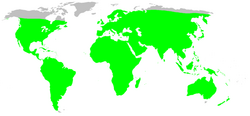Biology:Spitting spider
| Spitting spiders | |
|---|---|

| |
| Scytodes thoracica | |

| |
| Scytodes male, showing pedipalps | |
| Scientific classification Error creating thumbnail: Unable to save thumbnail to destination
| |
| Domain: | Eukaryota |
| Kingdom: | Animalia |
| Phylum: | Arthropoda |
| Subphylum: | Chelicerata |
| Class: | Arachnida |
| Order: | Araneae |
| Infraorder: | Araneomorphae |
| Family: | Scytodidae Blackwall, 1864 |
| Diversity[1] | |
| 4 genera, 252 species | |

| |
Spitting spiders (Scytodidae) is a family of araneomorph spiders first described by John Blackwall in 1864.[2] It contains over 250 species in five genera,[1] of which Scytodes is the best-known.
Description
Like recluse spiders and coneweb spiders, they have six eyes arranged in three pairs and are haplogyne, meaning they have less complex female genitalia. They differ from these families in having a dome-shaped carapace and in their characteristic flecked pattern of spots.
Hunting technique
Scytodidae catch their prey by spitting a fluid that congeals on contact into a venomous and sticky mass. The fluid contains both venom and spider silk in liquid form, though it is produced in venom glands in the chelicerae. The venom-laced silk both immobilizes and envenoms prey such as silverfish. In high-speed footage the spiders can be observed swaying from side to side as they "spit", catching the prey in a criss-crossed "Z" pattern; it is criss-crossed because each of the chelicerae emits half of the pattern. The spider usually strikes from a distance of 10 to 20 millimetres (0.39 to 0.79 in) and the entire attack sequence only lasts 1/700th of a second.[3] After making the capture, the spider typically bites the prey with venomous effect, and wraps it in the normal spider fashion with silk from the spinnerets.[4]
Presocial behaviour
Some species exhibit presocial behaviour, in which mature spiders live together and assist the young with food.[5]
Genera

(As of January 2024), the World Spider Catalog accepts the following genera:[1]
- Dictis L. Koch, 1872 — Asia, Oceania, North America and Seychelles
- Scyloxes Dunin, 1992 — Tajikistan
- Scytodes Latreille, 1804 — South America, Africa, Asia, North America, Caribbean, Central America, Oceania, Spain
- Stedocys Ono, 1995 — China, Malaysia, Thailand
See also
References
- ↑ 1.0 1.1 1.2 "Family: Scytodidae Blackwall, 1864". Natural History Museum Bern. http://www.wsc.nmbe.ch/family/84.
- ↑ Blackwall, J. (1864). A history of the spiders of Great Britain and Ireland. Ray Society, London. pp. 175–384.
- ↑ Piper, Ross (2007). Extraordinary Animals: An Encyclopedia of Curious and Unusual Animals. Westport, Conn.: Greenwood Press. ISBN 978-0-313-33922-6. https://archive.org/details/extraordinaryani0000pipe.
- ↑ Gilbert, C.; Rayor, L.S. (1985). "Predatory behavior of spitting spiders (Araneae, Scytodidae) and the evolution of prey wrapping". Journal of Arachnology 13 (2): 231–241.
- ↑ Miller, Jeremy (2010). "Taxon page for Scytodes socialis Miller, 2006.". http://araneae.lifedesks.org/pages/34605.
External links
- Arachnology Home Pages: Araneae
- Info about Spitting spider Scytodes thoracica
- Platnick, N.I. 2003. World Spider Catalog
Wikidata ☰ Q11710 entry
 |

